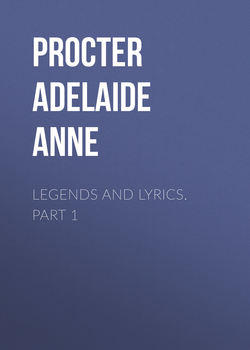Legends and Lyrics. Part 1

Реклама. ООО «ЛитРес», ИНН: 7719571260.
Оглавление
Procter Adelaide Anne. Legends and Lyrics. Part 1
DEDICATION
AN INTRODUCTION BY CHARLES DICKENS
VERSE: THE ANGEL’S STORY
VERSE: ECHOES
VERSE: A FALSE GENIUS
VERSE: MY PICTURE
VERSE: JUDGE NOT
VERSE: FRIEND SORROW
VERSE: ONE BY ONE
VERSE: TRUE HONOURS
VERSE: A WOMAN’S QUESTION
VERSE: THE THREE RULERS
VERSE: A DEAD PAST
VERSE: A DOUBTING HEART
VERSE: A STUDENT
VERSE: A KNIGHT ERRANT
VERSE: LINGER, OH, GENTLE TIME
VERSE: HOMEWARD BOUND
VERSE: LIFE AND DEATH
VERSE: NOW
VERSE: CLEANSING FIRES
VERSE: THE VOICE OF THE WIND
VERSE: TREASURES
VERSE: SHINING STARS
VERSE: WAITING
VERSE: THE CRADLE SONG OF THE POOR
VERSE: BE STRONG
VERSE: GOD’S GIFTS
VERSE: A TOMB IN GHENT
VERSE: THE ANGEL OF DEATH
VERSE: A DREAM
VERSE: THE PRESENT
VERSE: CHANGES
VERSE: STRIVE, WAIT, AND PRAY
VERSE: A LAMENT FOR THE SUMMER
VERSE: THE UNKNOWN GRAVE
VERSE: GIVE ME THY HEART
VERSE: THE WAYSIDE INN
VERSE: VOICES OF THE PAST
VERSE: THE DARK SIDE
VERSE: A FIRST SORROW
VERSE: MURMURS
VERSE: GIVE
VERSE: MY JOURNAL
VERSE: A CHAIN
VERSE: THE PILGRIMS
VERSE: INCOMPLETENESS
VERSE: A LEGEND OF BREGENZ
VERSE: A FAREWELL
VERSE: SOWING AND REAPING
VERSE: THE STORM
VERSE: WORDS
VERSE: A LOVE TOKEN
VERSE: A TRYST WITH DEATH
VERSE: FIDELIS
VERSE: A SHADOW
VERSE: THE SAILOR BOY
VERSE: A CROWN OF SORROW
VERSE: THE LESSON OF THE WAR (1855)
VERSE: THE TWO SPIRITS (1855)
VERSE: A LITTLE LONGER
VERSE: GRIEF
VERSE: THE TRIUMPH OF TIME
VERSE: A PARTING
VERSE: THE GOLDEN GATE
VERSE: PHANTOMS
VERSE: THANKFULNESS
VERSE: HOME-SICKNESS
VERSE: WISHES
VERSE: THE PEACE OF GOD
VERSE: LIFE IN DEATH AND DEATH IN LIFE
VERSE: RECOLLECTIONS
VERSE: ILLUSION
VERSE: A VISION
VERSE: PICTURES IN THE FIRE
VERSE: THE SETTLERS
VERSE: HUSH
VERSE: HOURS
VERSE: THE TWO INTERPRETERS
VERSE: COMFORT
VERSE: HOME AT LAST
VERSE: UNEXPRESSED
VERSE: BECAUSE
VERSE: REST AT EVENING
VERSE: A RETROSPECT
VERSE: TRUE OR FALSE
VERSE: GOLDEN WORDS
Отрывок из книги
In the spring of the year 1853, I observed, as conductor of the weekly journal Household Words, a short poem among the proffered contributions, very different, as I thought, from the shoal of verses perpetually setting through the office of such a periodical, and possessing much more merit. Its authoress was quite unknown to me. She was one Miss Mary Berwick, whom I had never heard of; and she was to be addressed by letter, if addressed at all, at a circulating library in the western district of London. Through this channel, Miss Berwick was informed that her poem was accepted, and was invited to send another. She complied, and became a regular and frequent contributor. Many letters passed between the journal and Miss Berwick, but Miss Berwick herself was never seen.
How we came gradually to establish, at the office of Household Words, that we knew all about Miss Berwick, I have never discovered. But we settled somehow, to our complete satisfaction, that she was governess in a family; that she went to Italy in that capacity, and returned; and that she had long been in the same family. We really knew nothing whatever of her, except that she was remarkably business-like, punctual, self-reliant, and reliable: so I suppose we insensibly invented the rest. For myself, my mother was not a more real personage to me, than Miss Berwick the governess became.
.....
Those readers of Miss Procter’s poems who should suppose from their tone that her mind was of a gloomy or despondent cast, would be curiously mistaken. She was exceedingly humorous, and had a great delight in humour. Cheerfulness was habitual with her, she was very ready at a sally or a reply, and in her laugh (as I remember well) there was an unusual vivacity, enjoyment, and sense of drollery. She was perfectly unconstrained and unaffected: as modestly silent about her productions, as she was generous with their pecuniary results. She was a friend who inspired the strongest attachments; she was a finely sympathetic woman, with a great accordant heart and a sterling noble nature. No claim can be set up for her, thank God, to the possession of any of the conventional poetical qualities. She never by any means held the opinion that she was among the greatest of human beings; she never suspected the existence of a conspiracy on the part of mankind against her; she never recognised in her best friends, her worst enemies; she never cultivated the luxury of being misunderstood and unappreciated; she would far rather have died without seeing a line of her composition in print, than that I should have maundered about her, here, as “the Poet”, or “the Poetess”.
With the recollection of Miss Procter as a mere child and as a woman, fresh upon me, it is natural that I should linger on my way to the close of this brief record, avoiding its end. But, even as the close came upon her, so must it come here.
.....